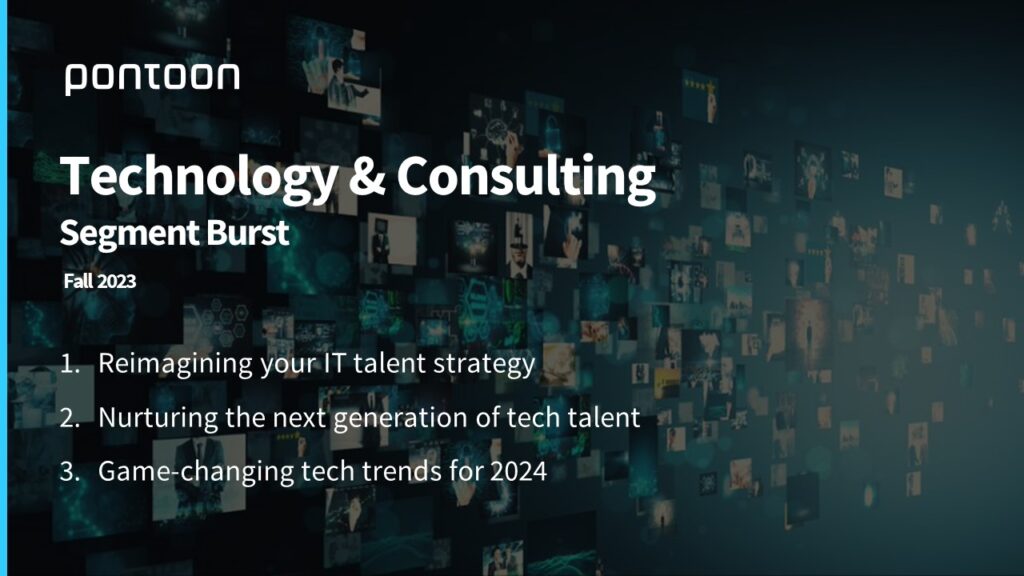Technology & Consulting Segment Burst: Fall 2023
Research
.
In the Fall 2023 Technology and Consulting Segment Burst, we explore the most recent trends in the sector.
- Reimagining your IT talent strategy
- Nurturing the next generation of tech talent
- Game-changing tech trends for 2024
Reimagining your IT talent strategy
Amid substantial layoffs in the tech industry, which have paradoxically increased the pool of available candidates, firms are still grappling with a demanding talent acquisition landscape. Interestingly, a mere 13% of tech employers report success in attracting and retaining the tech professionals they need. This is concerning as 72% of US tech workers are considering a job change within the next year, which suggests the issue will not abate anytime soon.
In such a fiercely competitive environment, it’s essential to recognise that having or developing the latest technology solutions, even AI-powered solutions, is not the only determinant of business success. Recent research has shown that the real game-changer could be building, nurturing, and stimulating an exceptional, integrated tech team.
Tech teams are beginning to understand and appreciate the significance of “softer” skills such as leadership, communication, problem-solving, and collaboration. While technical expertise remains an asset, these non-technical competencies play a crucial role in the success of a tech-focused team. Moreover, they are less likely to become obsolete over time, unlike technical skills, which, on average, become outdated every 2.5 years. Therefore, relying solely on current tech skills during hiring may not be a sustainable long-term strategy.
While some tech specialists may continue to hone their skills in digital depth and specificity, the ability to lead and empathise is increasingly becoming a key consideration in evaluating potential hires. For businesses to thrive, the focus should be on acquiring talent that possesses the necessary technical skills and demonstrates strong leadership, effective communication, problem-solving capabilities, and a collaborative spirit. By doing so, employers can build resilient, adaptable teams that drive business success.
Nurturing the next generation of tech talent
Addressing the comprehensive needs of younger workers has become a top priority for 72% of tech leaders. Many Gen Zers who entered the workforce amidst the pandemic have preferred virtual work settings. However, they often face challenges establishing robust social connections through Zoom, Slack, or Teams.
Tech companies must devise innovative and effective methods to support their younger remote tech talent. Firms must strive to create a sense of community within virtual teams, which can be particularly challenging given the lack of physical interaction.
The ongoing debate over the most effective work model – whether fully flexible, structured hybrid, or entirely in-office – adds another layer of complexity. Each model has its unique set of advantages and disadvantages. To grasp this changing landscape, companies need practical strategies and solutions that cater to individual preferences while still meeting organisational needs.
Companies must meet their needs as younger generations chart their course into the workforce. To achieve this, firms can offer free certification opportunities, enabling young tech workers to upskill and remain competitive in an industry perpetually in flux. Additionally, employers can explore innovative approaches to mentorship, such as virtual or group mentoring, which may resonate with remote employees.
Reverse-mentoring programmes are another avenue worth exploring. Encouraging younger workers to join these initiatives lets them share their expertise on emerging technologies, which can offer valuable insights to more senior team members.
Another facet to consider is the provision of flexible work arrangements. Younger workers often prioritise work-life balance, and offering options such as remote work or flexible hours can cater to these needs effectively.
Lastly, prioritising skill development through regular training can empower young tech workers to advance their careers and instil a sense of value and belonging within the company. By implementing these strategies, companies can cultivate a positive work environment that supports, nurtures, and retains young talent. This will enhance organisational culture, turning tech companies into employers of choice for the next generation of professionals.
Game-changing tech trends for 2024
As we transition into 2024, three technological breakthroughs are set to redefine industries and alter work and talent interactions across the globe: AI proficiency, cyber resilience, and quantum computing.
This year marked a significant milestone in deploying and integrating generative AI across various tech sectors, indicating its acceptance as a mainstream technology. The capabilities of this technology are vast, and 2024 is anticipated to bring forth more evidence of its applicability.
Our 2023 Global Future Workforce of the Future report reveals that 70% of workers worldwide already use generative AI in their professional lives, and a mere 7% believe AI will render their jobs obsolete. Tech professionals are pivoting to artificial intelligence as they face wage stagnation, job cuts, and reduced demand for their current skill sets, all driven by the escalating need for AI specialists. Organisations can help tech workers by offering complimentary AI certification programmes to enable them to enhance their skills and remain competitive in the sector.
Secondly, tech firms urgently need to bolster their safeguards against cyber threats. By the close of 2024, the financial impact of cyber-attacks is projected to surge beyond $10 trillion. Today’s companies critically require tech solutions that provide robust cybersecurity measures and effective risk mitigation against cyber-attacks. Thorough assessment, resource deployment, and verification of these solutions can help companies stay prepared for potential cyber threats and safeguard themselves from data breaches, monetary losses, and damage to their reputation.
Finally, in 2024, quantum computing is expected to transition from hype to tangible benefits for employers. Quantum computing leverages the principles of quantum physics, such as quantum entanglement and superposition. Its adoption has surged as companies strive to innovate quickly.
For instance, banks can leverage quantum computing to enhance security, strengthen fraud detection mechanisms, and conduct comprehensive risk assessments. Employers eager to remain at the forefront should consider cultivating a quantum-ready workforce to capitalise on the advantages of this burgeoning technology.
Pontoon’s Next Gen RPO
Experience the future of Recruitment Process Outsourcing (RPO) with Pontoon’s Next Gen RPO solution. Unleash the power of AI-driven technology to revolutionise your talent acquisition. Discover a whole new way of sourcing and acquiring top talent. Click here to learn more.
“Next Gen RPO empowers organisations to attract top talent, make informed decisions, build diverse teams, and optimise workforce strategies like never before.“
Christian Lortz – VP of Digital at Pontoon
Related Post
In the Summer 2023 Technology and Consulting Segment Burst, we explore the most recent trends in the sector.
Preparing for AI's impact on the tech talent marketplace
Flexibility in building ...





